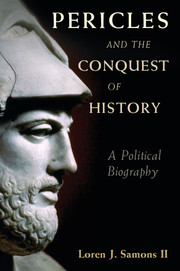Book contents
- Frontmatter
- Dedication
- Epigraph
- Contents
- List of Figures and Maps
- Preface
- Important Dates
- INTRODUCTION Biography and History
- ONE To Be an Athenian
- TWO Curses, Tyrants, and Persians (ca. 500–479)
- THREE Early Career: The Dominance of Kimon (ca. 479–462/1)
- FOUR The Democratic Revolution (ca. 462/1–444/3)
- FIVE A Greek Empire (ca. 460–445)
- SIX Pericles and Sparta: The Outbreak of the Great War (444/3–431)
- SEVEN Pericles and Athenian Nationalism: The Conquest of History
- EIGHT Athenian Culture and the Intellectual Revolution: Pericles and the People
- Epilogue The Periclean Tradition
- Appendices
- Notes
- Bibliography
- Index
Epilogue - The Periclean Tradition
Published online by Cambridge University Press: 18 December 2015
- Frontmatter
- Dedication
- Epigraph
- Contents
- List of Figures and Maps
- Preface
- Important Dates
- INTRODUCTION Biography and History
- ONE To Be an Athenian
- TWO Curses, Tyrants, and Persians (ca. 500–479)
- THREE Early Career: The Dominance of Kimon (ca. 479–462/1)
- FOUR The Democratic Revolution (ca. 462/1–444/3)
- FIVE A Greek Empire (ca. 460–445)
- SIX Pericles and Sparta: The Outbreak of the Great War (444/3–431)
- SEVEN Pericles and Athenian Nationalism: The Conquest of History
- EIGHT Athenian Culture and the Intellectual Revolution: Pericles and the People
- Epilogue The Periclean Tradition
- Appendices
- Notes
- Bibliography
- Index
Summary
Pericles has figured prominently in condemnations of and hymns to Athens. He has frequently been compared to great modern statesmen, and yet his singular import remains virtually unparalleled in the history of popular government. As a brilliant rhetorician, extreme nationalist, immensely popular politician, and visionary focused on power and reputation, Pericles continues to provide the prime example of what one man can achieve, for good or ill, in a democracy.
Athens produced no other Pericles. No political figure in the century of independent, democratic government after his death in 429 ever approached the influence, impact, and reputation of Pericles son of Xanthippus. True, no Athenian statesman after Pericles’ death possessed the resources Athens enjoyed in the 440s and 430s BC. By 428 the Athenians had expended most of the monetary reserves Pericles’ policies had socked away for future needs. So far as we can tell, Athens never possessed more than a few thousand talents of reserves in the later fifth century (and this only briefly, ca. 415), and its resources in the fourth century were far reduced even from those levels.
The Peloponnesian War ground to a halt in 404, when the Spartans cut off Athens and starved its citizens into submission after destroying most of the Athenian fleet in the previous year. Athens lost its empire and was temporarily reduced to the status of a Spartan dependency. Many Athenians in these years apparently took a dim view of Pericles’ policies and leadership. Thucydides composed his defense of the leader (2.65) in part to answer all-too-common criticisms of Pericles’ conduct in leading Athens into an ultimately disastrous war.
Subsequent Athenian leaders rarely called on Pericles’ memory even as they attempted to revive some of his policies. True, the comic poet Eupolis brought Pericles onto the stage in 412 as an example of a great statesman who could help Athens face the Sicilian disaster of the previous year, when the entire Athenian invasion force had been destroyed. But in 412 the war in Greece had not yet been lost.
- Type
- Chapter
- Information
- Pericles and the Conquest of HistoryA Political Biography, pp. 211 - 218Publisher: Cambridge University PressPrint publication year: 2016



